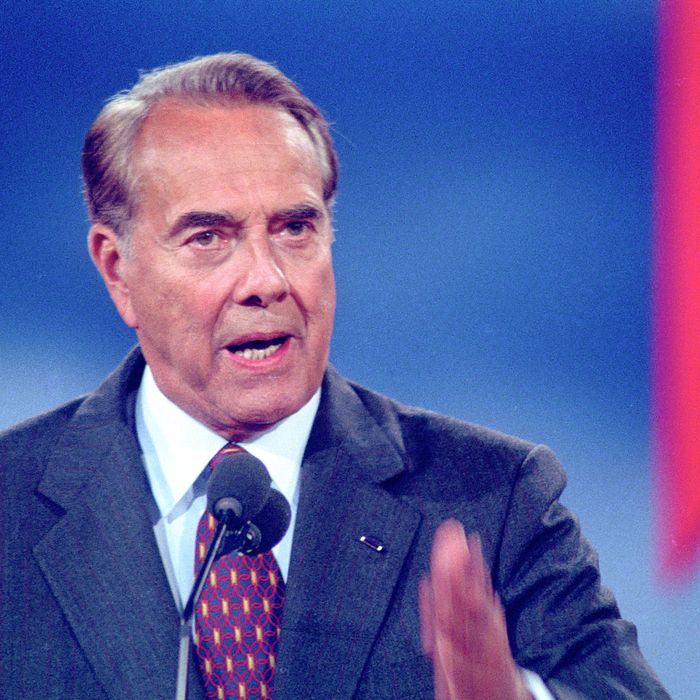
Robert Dole of Kansas, who spent 36 years in Congress as a Republican and ran unsuccessfully for vice-president once and for president three times, has died of lung cancer at the age of 98. It is indeed amazing he lived so long, having been all been surrendered to death over three quarters of a century earlier to World War II injuries that marked him forever physically but didn’t break his will. Dole was very much a representative of his “Greatest” Generation. He was the last World War II veteran to win a major-party presidential nomination and remained a paragon of a heartland conservatism that was more practical and traditional than ideological. He was chairman of the National Republican Committee just before Richard Nixon’s corruption and abuse of power nearly destroyed the GOP, and was later Senate Majority Leader when his House counterpart, Newt Gingrich, sent Dole’s party on an extremist bender which has continued ever since. Throughout his political career, he seemed a bit out of step, or even anachronistic, compared to much of his party.
This became apparent to the whole nation in 1976, when Gerald Ford chose the second-term Kansas Senator to become his running-mate after conservatives (and intense competition from Ronald Reagan) forced Vice-President Nelson Rockefeller off the ticket. In a debate with Democratic veep nominee Walter Mondale, Dole indulged in an ancient meme (though the term was unknown then) of the Democrat War Death Count, adding up U.S. fatalities in military conflicts that occurred during Democratic presidencies to deflect criticism of the Republican Ford administration. Mondale sharply asked if Dole really meant to call World War II a “Democrat war,” and Dole changed the subject. He has probably deployed the idea in rubber chicken political dinners for decades.
Dole ran briefly and poorly for president in 1980, unable to make headway against George H.W. Bush’s innovating strategy of practically moving to Iowa, or Ronald Reagan’s mastery of the conservative movement. In his second run in 1988, he upset Bush (then the sitting two-term veep) in Iowa, but then lost New Hampshire and quickly lost ground after he stubbornly refused to take a no-new-taxes oath (the same oath Bush took and later violated).
He finally won a presidential nomination in 1996 over a scattered and relatively undistinguished field, becoming at 73 the second-oldest major party nominee in history (the oldest, by just a few months, was Ronald Reagan in his 1984 reelection bid). He thus served as the perfect generational foil to the all-baby-boomer reelection ticket of Clinton and Gore, long before Donald Trump, Bernie Sander, and Joe Biden made septuagenarian presidential runs routine. In Dole’s convention acceptance speech, he spoke on his own generation with reverence:
Let me be the bridge to an America than only the unknowing call myth. Let me be the bridge to a time of tranquility, faith and confidence in action.
And to those who say it was never so, that America’s not been better, I say you’re wrong. And I know because I was there. And I have seen it. And I remember.
A few weeks later in his own acceptance speech Clinton offered a striking contrast by speaking of his own aspiration to “build a bridge to the 21st century.” Poor Dole was nostalgic too early, two decades before Donald Trump won by promising to “make America great again.”
Most of all, even though he maintained a consistently solid conservative voting record in Congress during all those years in Washington, and could deploy a savage sense of humor in partisan warfare (he once said of fellow war hero and Senate colleague John Kerry: “Three Purple Hearts, and never bled that I know of.”) Dole never mastered the counter-revolutionary spirit of his rival Gingrich or his successors in Republican leadership. He maintained parochial attachments, single-handedly saving the food stamp program beloved of midwestern farmers in 1981 when Reagan proposed to kill it as part of a big welfare initiative. And in 1983 he worked with Democrat Daniel Patrick Moynihan to extend the solvency of Social Security.
Although he resigned from the Senate upon winning his party’s presidential nomination, he was always the consummate Member of Congress; one problem he had in national politics was a tendency to talk in legislative short-hand, and he was often mocked for sounding like a Senate press release, referring to himself in the third person.
Dole’s last years solidified his reputation as an old-school Republican loyalist. He endorsed Donald Trump twice, though he refused to endorse Trump’s Big Lie about the 2020 elections. Upon the death of his bitter rival Poppy Bush, a wheelchair-bound Dole struck a chord by saluting Bush’s casket as it lay in state in the Capitol.
Eventually the old political warrior’s famous sense of humor began to seem avuncular rather than biting, and by the time of his final illness he was considered the ultimate throwback to a more civil and constructive — if not terribly imaginative — era of U.S. politics. In 1976 he was asked why he wanted to be vice-president and he replied: “It’s inside work with no heavy lifting.” It’s probably just as well he didn’t win.
"last" - Google News
December 06, 2021 at 11:38AM
https://ift.tt/31zcLee
RIP Bob Dole, Last of the Greatest Generation’s Presidential Candidates - New York Magazine
"last" - Google News
https://ift.tt/2rbmsh7
https://ift.tt/2Wq6qvt
Bagikan Berita Ini















0 Response to "RIP Bob Dole, Last of the Greatest Generation’s Presidential Candidates - New York Magazine"
Post a Comment